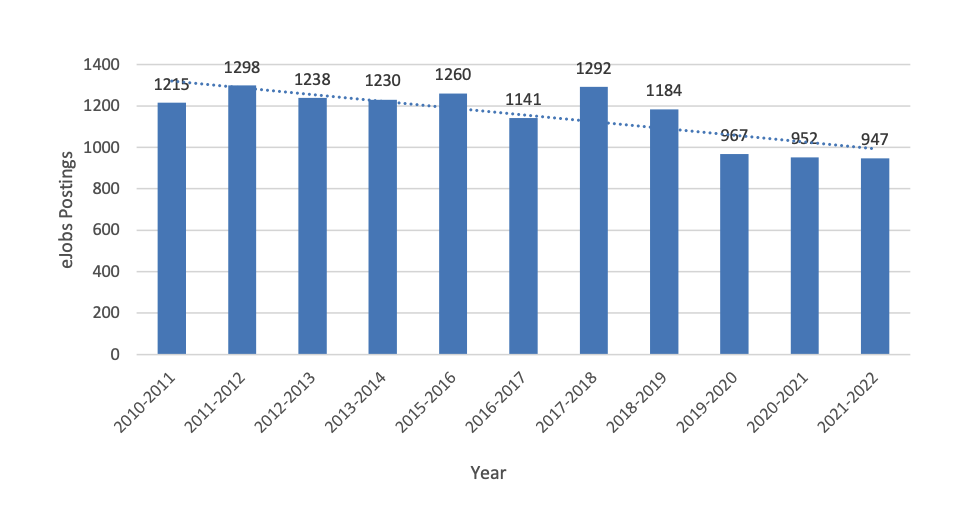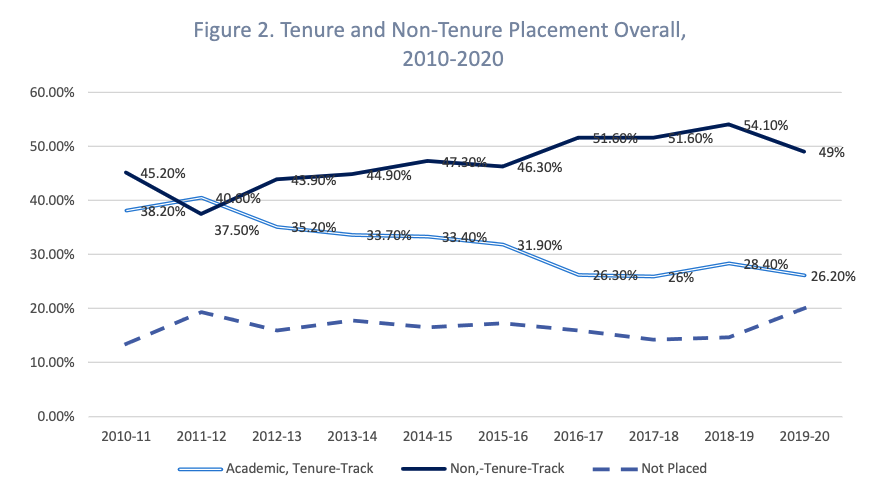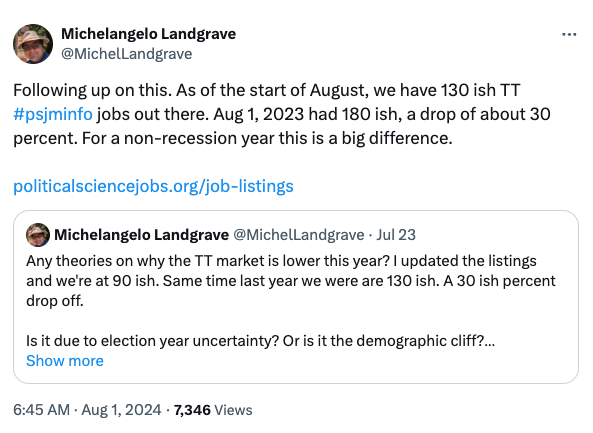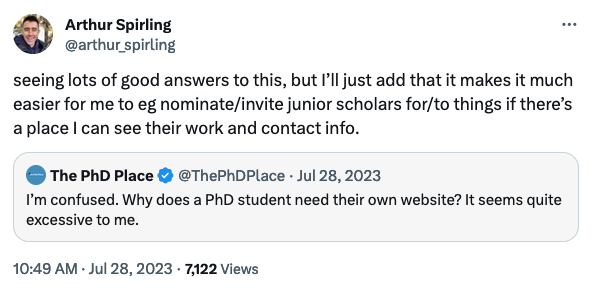Why You Need an Academic Website
Published:

(Dall*E's interpretation of a PhD student making a website.)
Should graduate students (or early-career academics more broadly) have a website?
I guess the answer to the question was controversial given the Twitter (err…X) debate surrounding it in (checks notes) Summer 2023. I had already come to this debate late when I first decided to write this post, and like any good academic, my actual response comes even later. So late as to miss any possible benefit of joining in on the discussion…such that it is probably not even worth mentioning.
Alas. I am nothing if not on brand.
Given the title of this post, I have spoiled my own opinion on the topic and am very much a partisan warrior in this fight. I think it’s necessary for any PhD student or early career academic to have a website.
Note: If you don’t need to be convinced but aren’t sure how to make a website or what to put on it, scroll to the bottom of this post for practical advice.
It’s 2023 2024, not 19931
I was not in academia in 1993 (I was in diapers), but I am pretty sure things were different than they are today. Bill Clinton was president, it took a lot longer to run a regression, and it was easier to get an academic job.
Although I was not able to find time series data on the number of jobs versus number of applicants, the APSA e-jobs reports provide some insight into the decline in the raw number of tenure track jobs over time. This report, from the 2021-2022 job market shows a relatively stable market with around 1,200 jobs per year, then a decline with the onset of COVID that continued for several years.
However, it’s important to note that the above figure covers all job postings. This chart, in the 2018-2020 report, indicates that the number of tenure-track jobs have steadily declined over this period (even before 2020), replaced by non-tenure track jobs.
The anecdotal evidence I’ve heard indicates that job numbers recovered in the most recent cycles. But early evidence compiled by Professor Michelangelo Landgrave suggests that this increase may have been due to pent up demand, and the 2023-2024 market is down from last year.
These statistics only provide some weight to what we already know: it’s difficult to get a tenure-track job. There are generally more people competing for fewer slots, and the competition is increasing each year.
Academia is Sales
I don’t share these worrying statistics to depress or frighten (although apologies if that is the effect). I share them to illustrate the point that it’s hard out there, and finding a job is its own job. And part of that job is promoting yourself and your work because academia is actually sales. Oops. Sorry.
I think Political Scientist Arthur Spirling’s Tweet encapsulates this nicely:
If people cannot find you or figure out what you’re about, you cannot be invited to things. And no, your picture and email address on the department website do not count. As Arthur Spirling goes on to say in another Tweet—these do not usually include working papers. And I’ll add, they only occasionally include fields of study or subfields or current CVs. They are rarely updated, and only on the administrator’s or university’s annual schedule. If someone comes across your profile, but they don’t know what you study or what you are about, they will move on.
I am surprised by how often I look up a graduate student—perhaps I saw on Twitter (er…X) that they’ve won an award, or they’re going to be presenting on my conference panel), only to discover that I can find very-little-to-nothing about them. This is a missed opportunity for both of us.
And when you are attending conferences (if you follow my advice), you should be reaching out to people and asking for meetings. When you reach out and people don’t know you, they will inevitably look you up to learn who you are and what you’re about. They will probably still say yes even if you do not have a website. But if you do have one, then you maximize the quality of the meeting because they can get a sense of who you are and what you’re working on, and maybe even read your abstracts and ask about your papers.
From this perspective, you cannot afford not to have a website.
Making a Website in 2023 2024 Is Not Asking a Lot
Given the pressure to “publish or perish,” there is a concern that spending time to create and maintain a website is costly, and that time would be better spent on publishing. But this is a false tradeoff for several reasons.
First, promoting your publication is part of the publication process. Yes, the journal will advertise your article when it first comes out, but who will notice and who will remember? A website gives you a starting point to share your article and make it easy to find.
I am not so naive as to think that just posting a link on your website increases your article’s reach and engagement (I did work in advertising before getting my PhD), but it does create another point of contact for someone to find it. If you meet someone at a conference and they look you up, they might find your paper. If you have your website url in your email signature and someone clicks on it, they might find your paper. If someone googles the topic of your paper, it’s possible they will find your website and that article. A website creates a touchpoint. And often, you can post the pre-publication version of your paper on your website even after it’s published, so people who lack expensive institutional subscriptions can read your work.
Second, creating a website can generally be quite quick and easy. And they rarely need updating (unless you’re super prolific and publishing constantly…in which case…what are you doing without a website!?). Again, it’s 2023 2024, not 1993. In 1993, making a website was quite an undertaking. In 2023 2024, there are so many free and/or user-friendly services to make the process easy. As I describe below, there are several almost-free options and many are easy to use. And once you set up your website it’s good to go. It’s not a Twitter (err…X) account that requires continual checking, posting, and engagement. It just sits there. And when you have a new working paper or a change to your CV or new teaching materials (or a new 2000 word blog post because you just cannot help yourself), you add one new line. That’s it. Set it and forget it.
But I Don’t Have Anything to Put on My Website
Ok, fair enough. If you are a first-year graduate student, you likely do not have working papers or a research agenda or teaching experience to share. If that is the case, then you probably do not need a website just yet.
I did not create my website until my second year of graduate school when I had a working paper to share and when I was planning to attend my first conference. This is a good rule of thumb. You should make a website when you have something to share. And when you’re attending your first conference, you should have something to share.
What Should I Put On My Website?
Like many things in academia (journal articles, job market materials), websites are very formulaic. Don’t deviate too much from this! Academics are expecting, and looking for, certain things on your website, so if you make them too hard to find or get too creative, you’re putting up another barrier. Play within the constraints of the format. Don’t try to create a new format.
Most websites have the following structure:
- Welcome/About: a landing page where you say a bit about your institutional affiliation, position, and broader research and/or teaching agenda.
- Research: a list of publications, including those published (with links to the publisher’s site and the ungated version) and working papers (with links if and when possible).
- Teaching: the courses you teach or have taught, and optionally, links to syllabi and teaching materials.
- Contact: my contact information is on the homepage and sidebar, so I don’t have this page, but many do.
- Anything extra: I have another page with these blog posts. Others have pages with their own blog posts, press articles, interests, etc. Again, show some personality, but be careful here! Don’t go too crazy. This is your professional website. Save the pictures and blog posts about your FunkoPop collection for your personal Substack.
- URL: you should probably spend the ~$10 a year for a custom domain name if possible.
Some Resources for Making a Website
My goal here is to convince you about the importance of creating a website and the ease with which it can be done, not teach you how to make one from scratch. Fortunately, others have done this work better than I could have:
- Rob Williams has an excellent blog post about how to create a free GitHub pages website (like mine). This is the post I followed to set up the website you’re reading right now.
- Mimansa Jaiswal has an incredibly thorough post reviewing several easy and cheap options for website-making.
- Carlisle Rainey has shared the code for his GitHub site that contains some fancy extras.
- Robert Kubinec recommends Quarto in this Tweet.
- Squarespace can be pricey, but their websites look nice and are very user friendly.
- There’s also Wordpress, which is fairly inexpensive and straightforward.
- There are others like Wix that I have seen people use, I just don’t have the experience to (or not to) recommend them.
A word of warning: your university might have its own website builder, and you can probably get a free domain name like yourname.youruniversity.com. I would caution against going down this route. You are probably going to change institutions one day (that’s the goal of the job market!), and then, you won’t be able to take it with you. You’ll have to start over. You want your own space that is all yours and that can evolve alongside you.
Go Forth and Make a Website
Is it just one more thing to do when you are already overworked and overstressed? Yes, I won’t deny it. But promoting yourself is part of the job, not a nice extra. You need to make it easy for people to find you so they can read and cite your work, hire you, invite you to things, and start a conversation. It takes a bit of effort. But it’s essential.
Again, this was a much better subhead when I started this post in Summer 2023. Publish or perish comes for blog posts too, I guess. ↩



